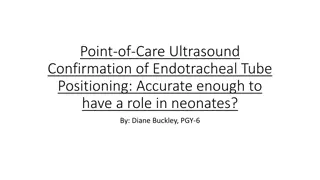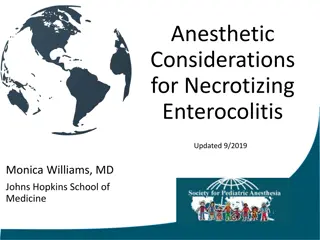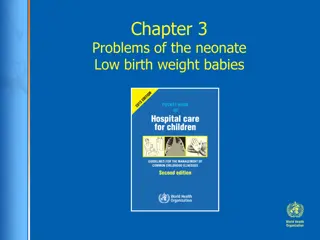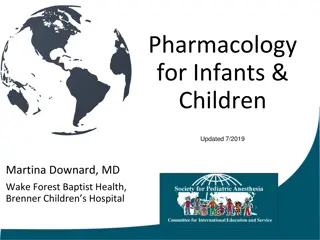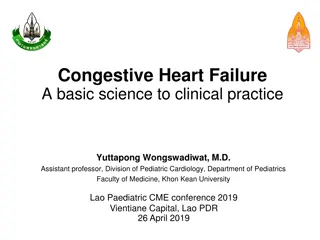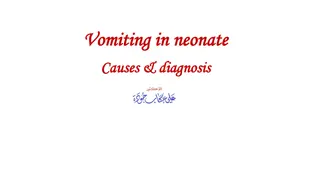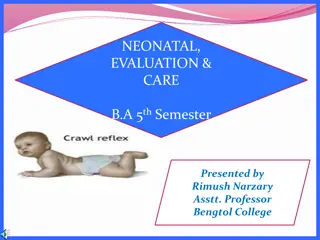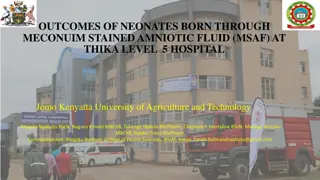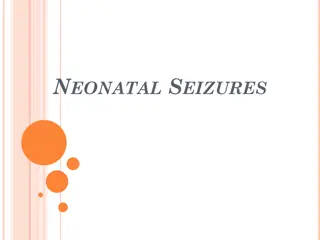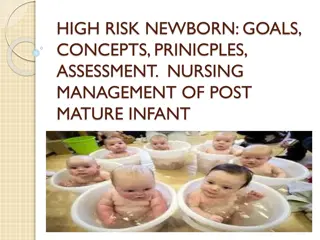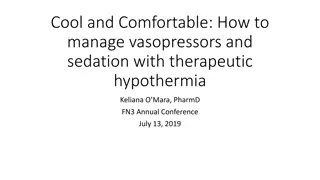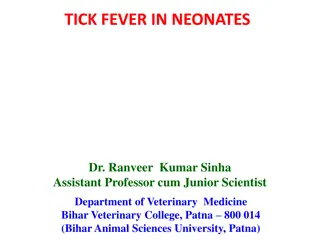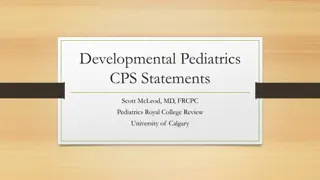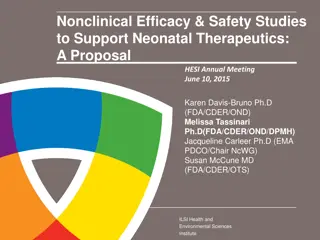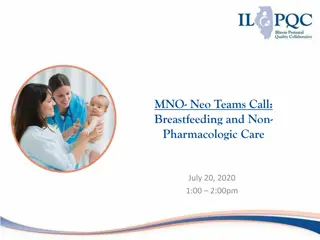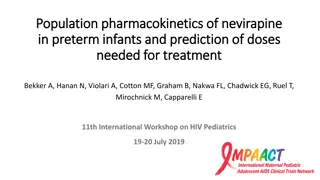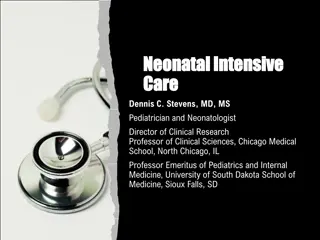inHealth Spring Retreat
The NICU Precision Medicine Center of Excellence aims to develop the infrastructure and expertise for personalized evaluation, counseling, and management of neonates at risk for brain injury.
17 views • 28 slides
Pediatric Trauma Resources: Chest, Abdomen, and Pelvis Review
This guideline provides resources for the evaluation and management of chest, abdomen, and pelvic trauma in pediatric patients. It covers a range of topics including thoracic injuries, abdominal trauma evaluation, nonoperative management protocols, and guidelines for various pediatric injuries. The
5 views • 21 slides
Point-of-Care Ultrasound in Neonatal ETT Positioning
Point-of-care ultrasound (POCUS) is emerging as a potential tool for confirming endotracheal tube (ETT) positioning in neonates, providing a viable alternative to X-ray examination. The study aims to assess the accuracy of POCUS in determining ETT placement, particularly by using the superior aspect
2 views • 25 slides
Anesthetic Considerations for Necrotizing Enterocolitis in Neonates
Necrotizing enterocolitis (NEC) is a serious gastrointestinal emergency in neonates, especially those with very low birth weight. Mortality rates are high, and early diagnosis is crucial. Key features, pathophysiology, implications for anesthetic preparation, and diagnostic considerations are discus
3 views • 20 slides
Management of Low Birth Weight Neonate: Baby Jonah Case Study Emergency Measures
Baby Jonah, born at 30 weeks gestation with low birth weight, exhibits emergency signs such as slow respiration and apnoea. The case highlights the importance of triage, emergency treatment, history and examination, laboratory investigations, diagnosis, treatment, supportive care, monitoring, discha
1 views • 27 slides
Pediatric Pharmacology Update: Perioperative Medications in Infants and Children
Gain insights on frequently used medications in the perioperative period for infants and children, including anesthesia medications. Explore pharmacokinetics, drug distribution in neonates, and the effects of common anesthesia agents on pediatric patients. Understand how immature kidney or liver fun
0 views • 43 slides
Understanding Congestive Heart Failure: From Pathophysiology to Clinical Practice
Congestive heart failure (CHF) is a condition characterized by systemic and pulmonary congestion due to the heart's inability to pump sufficient blood for the body's metabolism. It is closely linked to age and involves pathophysiology related to preload, afterload, contractility, and heart rate. Man
0 views • 20 slides
Neonatal Vomiting: Causes, Diagnosis, and Differential Diagnosis
Neonatal vomiting can be a concern when presenting with bile-stained or blood-stained vomit, projectile vomiting, or associated with weight loss and failure to grow. Various non-surgical and surgical conditions like Pyloric Stenosis can lead to vomiting in neonates. Common causes include Mid-gut vol
0 views • 16 slides
Understanding the Neonatal Period: Care and Evaluation
The neonatal period, also known as the newborn stage, encompasses the first 28 days of a baby’s life, characterized by rapid changes and fragility. This crucial stage requires specialized care, with sub-divisions such as the Period of the Partunate and Period of the Neonate. Commonly, neonates may
0 views • 19 slides
Outcomes of Neonates Born Through Meconium-Stained Amniotic Fluid at Thika Level 5 Hospital
Incidence of meconium-stained amniotic fluid is significant in Kenya, leading to complications like Meconium Aspiration Syndrome and more. This study aims to determine outcomes of neonates born through MSAF at Thika Level 5 Hospital to improve neonatal care and reduce related morbidities and mortali
0 views • 9 slides
Understanding Neonatal Seizures and Differentiating from Jitteriness
Neonatal seizures are a critical sign of neurologic dysfunction in newborns, with various types such as subtle, clonic, tonic, spasms, and myoclonic seizures. The immature brain's excitability and differences from the mature brain predispose neonates to seizures. Generalized clonic seizures are rare
0 views • 17 slides
Nursing Management of High-Risk Newborns: Post-Mature Infant Focus
High-risk newborns, including post-mature infants, require specialized care due to their increased chances of morbidity. Identification, goals, assessment, nursing principles, and management strategies are crucial in providing effective care for these vulnerable neonates. Predisposing factors, clini
0 views • 17 slides
Managing Vasopressors and Sedation in Therapeutic Hypothermia
This presentation discusses the pathophysiology of hypotension in neonates, the role of vasopressors and sedation in neonates with HIE, and the cardiovascular and pulmonary vascular effects of therapeutic hypothermia. It emphasizes the importance of a pathophysiology-based approach to managing vasop
0 views • 66 slides
Understanding Tick Fever in Neonates: Symptoms, Diagnosis, Treatment, and Prevention
Tick fever in neonates is a febrile disease transmitted by tick bites, with symptoms including fever, loss of appetite, depression, weakness, red urine, anemia, and jaundice. The disease can be diagnosed through clinical symptoms, tick presence, and blood smear examination. Treatment involves medica
0 views • 9 slides
Latest Updates in Developmental Pediatrics: CPS Statements Review
Covering the most recent Canadian Pediatric Society practice points and position statements in developmental pediatrics, this review addresses key topics like neonatal sensorineural hearing loss, risk factors, impact on development, and more. Gain insights into identifying hearing loss types, associ
0 views • 59 slides
Challenges in Supporting Neonatal Therapeutics: A Proposal Overview
Proposal presentation at HESI Annual Meeting discusses challenges in neonatal therapeutics, including off-label drug use in NICU, low clinical relevance in studies, and barriers to conducting neonatal trials. Mandates require inclusion of neonates in pediatric studies, but priorities and study desig
0 views • 22 slides
Neonatal Care Initiative Meeting Highlights
Neonatal care initiative meeting highlights the focus on improving breastfeeding rates, reducing pharmacologic treatment, and enhancing discharge planning for optimal care of infants. The aim is to achieve key performance measures statewide, emphasizing the importance of non-pharmacologic care proto
0 views • 29 slides
Population Pharmacokinetics of Nevirapine in Preterm Infants
Population pharmacokinetics of nevirapine in preterm infants were evaluated to predict the doses needed for treatment. Early antiretroviral treatment recommendations for neonates, challenges with available ARV formulations, and the importance of data to inform nevirapine dosing in preterm infants we
1 views • 17 slides
Neonatal Intensive Care Overview by Dr. Dennis C. Stevens, MD
Neonatal Intensive Care (NICU) involves specialized care for preterm and full-term newborn infants with various medical conditions, requiring a multidisciplinary approach. Dr. Dennis C. Stevens, a renowned Pediatrician and Neonatologist, highlights the challenges and importance of NICU care, emphasi
0 views • 22 slides


